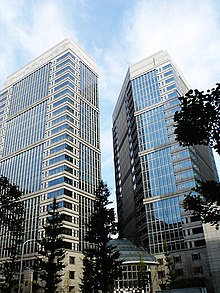Integralis
 |
|

NTT Headquarters
|
|
|
Native name
|
日本電信電話株式会社 |
|---|---|
| Public KK | |
| Traded as | : : NTT : TOPIX Core 30 Component |
| Industry | Telecommunications |
| Founded | August 1, 1952 (as government monopoly) April 1, 1985 (Private Company) |
| Headquarters | Ōtemachi, Chiyoda, Tokyo, Japan |
|
Key people
|
Hiroo Unoura, President & CEO Satoshi Miura, Chairman |
| Products | |
| Revenue |
|
|
|
|
|
|
|
| Total assets |
|
| Total equity |
|
| Owner | Government of Japan (32.6%) |
|
Number of employees
|
274,844 (2016) |
| Subsidiaries |
NTT Communications Dimension Data NTT Data NTT DoCoMo NTT i3 |
| Website |
www www |
The Nippon Telegraph and Telephone Corporation (日本電信電話株式会社 Nippon Denshin Denwa Kabushiki-gaisha), commonly known as NTT, is a Japanese telecommunications company headquartered in Tokyo, Japan. Ranked 65th in Fortune Global 500, NTT is the fourth largest telecommunications company in the world in terms of revenue.
The company is incorporated pursuant to the NTT Law (Law Concerning Nippon Telegraph and Telephone Corporation, Etc.). The purpose of the company defined by the Law is to own all the shares issued by Nippon Telegraph and Telephone East Corporation (NTT East) and Nippon Telegraph and Telephone West Corporation (NTT West) and to ensure proper and stable provision of telecommunications services all over Japan including remote rural areas by these companies as well as to conduct research relating to the telecommunications technologies that will form the foundation for telecommunications.
While NTT is listed on Tokyo, Osaka, New York, and London stock exchanges, the Japanese government still owns roughly one-third of NTT's shares, regulated by the NTT Law.
Established as a monopoly government-owned corporation in 1952, Nippon Telegraph and Telephone Public Corporation ( Nippon Denshin Denwa Kōsha) was privatized in 1985 to encourage competition in the telecom market. In 1987, NTT made the largest stock offering to date, at US$36.8 billion.
Because NTT owns most of the last mile (FTTC or FTTB/FTTH), it enjoys oligopolistic control over land lines in Japan. In order to weaken NTT, the company was divided into a holding company (NTT) and three telecom companies (NTT East, NTT West, and NTT Communications) in 1999. The NTT Law regulating NTT East and West requires them to serve only short distance communications and obligates them to maintain telephone service all over the country. They are also obligated to lease their unused optical fiber (dark fiber) to other carriers at regulated rates. NTT Communications is not regulated by the NTT Law.
...
Wikipedia
